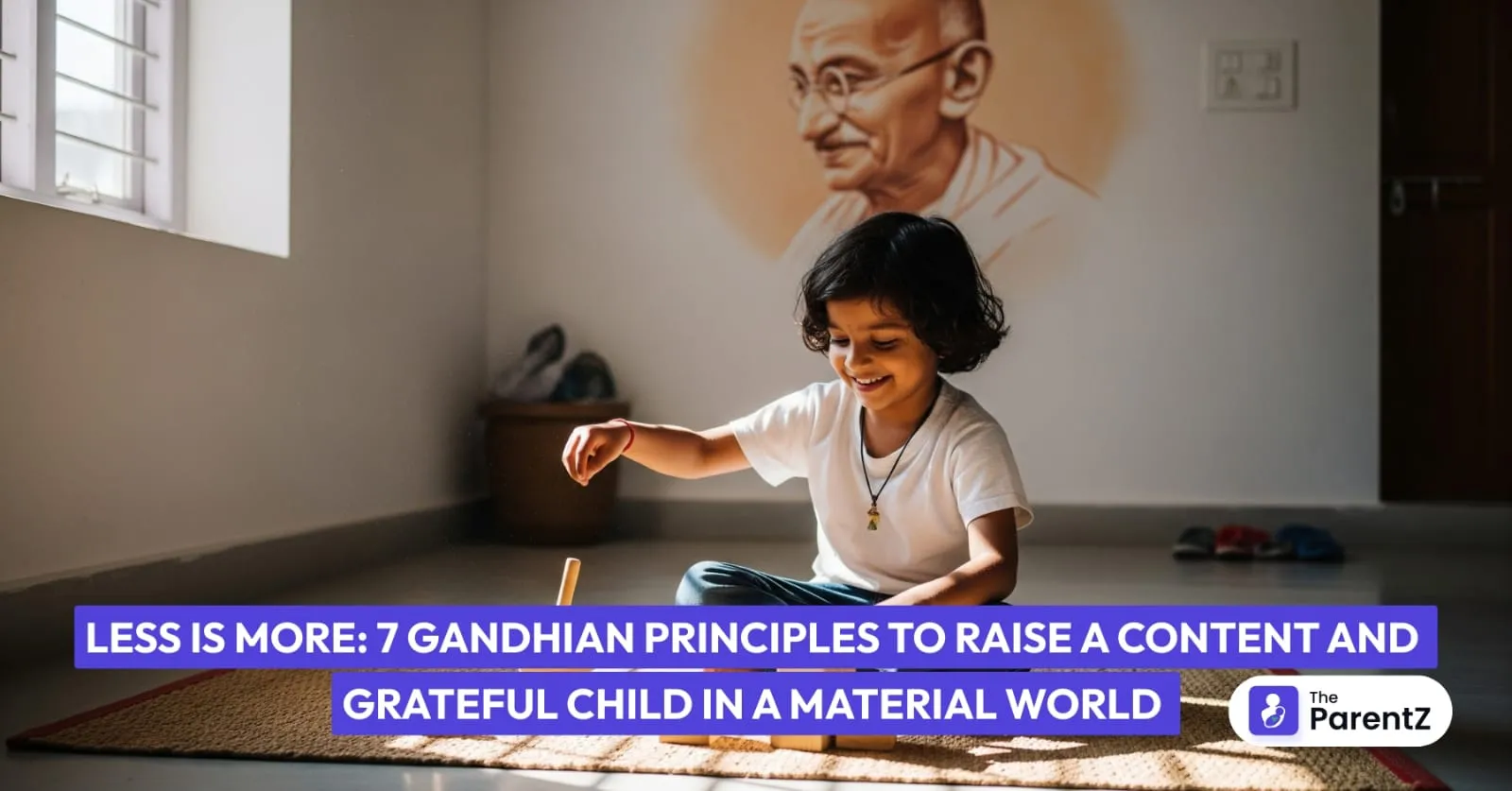Gandhi Jayanti is around the corner, and with it comes a wonderful chance for you to talk to your kids about more than just spinning wheels and khadi clothes. Today’s world is packed with stuff: gadgets, toys, big birthday parties, and endless shopping. But what if the secret to happier kids is Gandhi’s powerful idea: “Less is more”?
Let's revisit some timeless wisdom that can help us raise children who are happy, grateful, and grounded, even when surrounded by endless choices and shiny distractions.
1. Truth (Satya): Value Honesty, Big and Small
Gandhi believed that truth is the foundation for all goodness. At home, this can begin with tiny things:
- Encourage kids to speak honestly, whether it’s telling who finished the cookies or admitting a mistake at school.
- When children see parents own up to errors, they learn that truth matters even when it’s hard.
- Pro tip: Make a “truth moment” part of your evening routine where each family member shares something honest from their day.
Children realize that true happiness comes from honesty, not covering up mistakes.
2. Nonviolence (Ahimsa): Choose Kindness Every Day
Nonviolence doesn’t only mean avoiding fights; it’s about choosing gentle words and soft actions.
- Teach kids simple ways to avoid hurting anyone; don’t kick, don’t shout, don’t call names.
- Show them how kindness solves problems faster than force, like sharing toys instead of grabbing them.
- Pro tip: Turn “fights” into “peace talks.” If there’s a quarrel, kids can practice using polite words to sort it out.
Kids who learn ahimsa naturally become more caring, creating happier friendships and families.
3. Non-Possession (Aparigraha): Less Stuff, More Joy
Gandhi lived simply, using only what he truly needed. In a world where ads push children to want more stuff, this principle is more important than ever.
- Teach kids to value their favorite toys, not just want the newest ones.
- Have a “sharing and giving day” once a month, where kids donate toys or clothes they no longer use.
- Try a fun challenge: “Who can use the fewest items to enjoy a weekend?” Families discover that joy doesn’t come from piles of things, but from togetherness and creativity.
Children who practice aparigraha find joy in what they have, instead of wishing for more.
4. Non-Stealing (Asteya): Respect What’s Not Yours
Even small acts of taking what doesn’t belong to us can chip away at contentment. Gandhi taught asteya by respecting others’ belongings.
- Encourage children to ask before using a sibling’s stuff.
- Teach them to keep public places and schools neat, respecting things that belong to everyone.
- Model returning borrowed items on time and in good condition, so kids copy your habit.
Children learn to value and respect not just their own, but everyone’s things.
5. Mindful Diet (Asaucha): Eat Simple, Eat Respectfully
Gandhi believed in eating simple, plant-based meals and being grateful for food. Today, when packaged snacks and fast food tempt every child, this rule brings balance.
- Make mealtimes a pause for gratitude; thank the cook and nature for the food.
- Offer more fruits, vegetables, and homemade snacks, keeping food simple and healthy.
- Turn off screens during meals so family members can connect over food.
Kids who eat mindfully develop better health and a grateful heart.
6. Fearlessness (Abhaya): Stand Tall with Courage
Gandhi wanted every child to face challenges bravely and not be afraid to stand up for what’s right.
- Encourage kids to share their worries without judgment.
- Cheer them on to try new activities, speak up for themselves, and defend friends in tough situations.
- Remind them that being brave means asking for help when needed, not hiding problems.
Fearlessness doesn’t mean being bold all the time; it means not letting fear stop you from doing the right thing.
7. Equality (Sarvodaya): Treat Everyone Kindly
Gandhi’s dream was a world where no one feels left out. Families can nurture this by teaching children to be fair and welcoming.
- Invite all classmates to your child’s birthday, not just the “cool” ones.
- Praise kindness and inclusion more than winning.
- Avoid language that divides, like “good kids” and “bad kids.” Focus on growth.
Kids who learn Sarvodaya grow up appreciating differences and caring for all.
Bringing Gandhian Principles to Daily Life
Gandhi Jayanti is not just a day for quotes and pictures; it’s a chance to make lifelong habits. Here’s how families can keep these principles alive throughout the year:
- Create simple family rules together based on these principles.
- Tell bedtime stories from Gandhi’s life, showing real examples of these rules.
- Celebrate small victories; every time a child shares, tells the truth, or tries to eat mindfully, cheer them on.
When children see these values practiced daily at home, they become naturally content, grateful, and joyful; qualities that grow stronger as they do.
Conclusion
In a noisy, busy world, “less is more” is as powerful today as it was in Gandhi’s time. With seven simple principles, you can raise children who chase gratitude and kindness, not just stuff. This Gandhi Jayanti, let’s try small steps that fill our homes with laughter and our hearts with true contentment.
Less stuff. More smiles.





Be the first one to comment on this story.